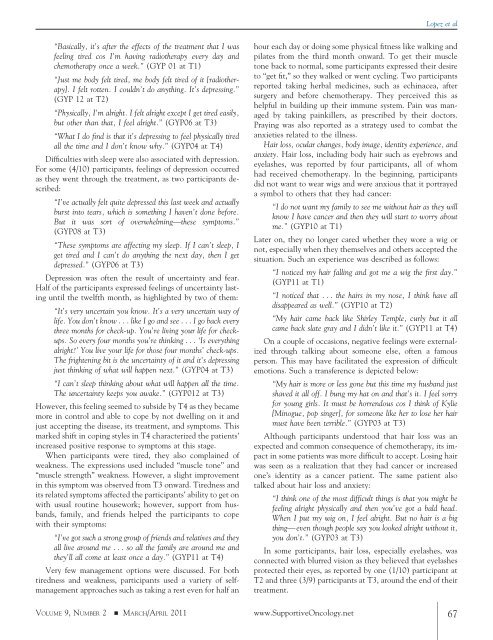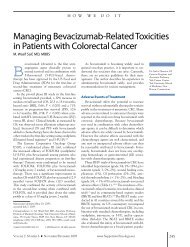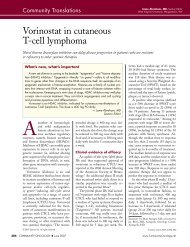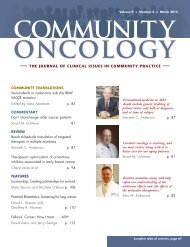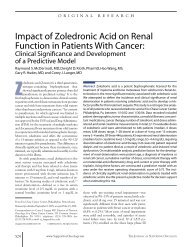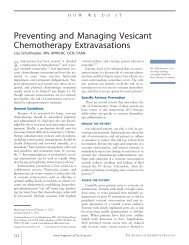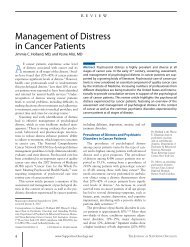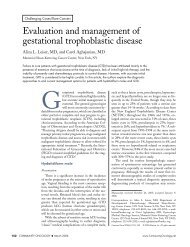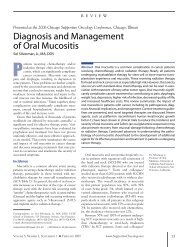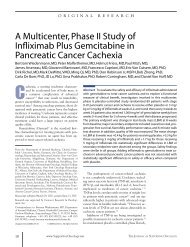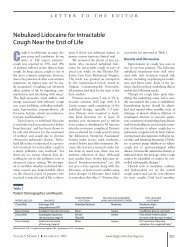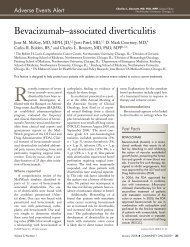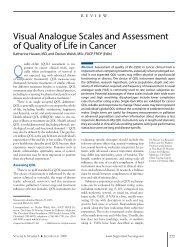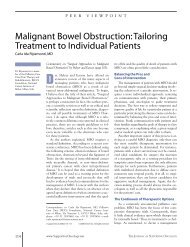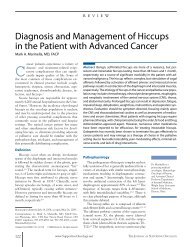Evaluating the “Good Death” Concept from Iranian Bereaved Family
Evaluating the “Good Death” Concept from Iranian Bereaved Family
Evaluating the “Good Death” Concept from Iranian Bereaved Family
Create successful ePaper yourself
Turn your PDF publications into a flip-book with our unique Google optimized e-Paper software.
“Basically, it’s after <strong>the</strong> effects of <strong>the</strong> treatment that I was<br />
feeling tired cos I’m having radio<strong>the</strong>rapy every day and<br />
chemo<strong>the</strong>rapy once a week.” (GYP 01 at T1)<br />
“Just me body felt tired, me body felt tired of it [radio<strong>the</strong>rapy].<br />
I felt rotten. I couldn’t do anything. It’s depressing.”<br />
(GYP 12 at T2)<br />
“Physically, I’m alright. I felt alright except I get tired easily,<br />
but o<strong>the</strong>r than that, I feel alright.” (GYP06 at T3)<br />
“What I do find is that it’s depressing to feel physically tired<br />
all <strong>the</strong> time and I don’t know why.” (GYP04 at T4)<br />
Difficulties with sleep were also associated with depression.<br />
For some (4/10) participants, feelings of depression occurred<br />
as <strong>the</strong>y went through <strong>the</strong> treatment, as two participants described:<br />
“I’ve actually felt quite depressed this last week and actually<br />
burst into tears, which is something I haven’t done before.<br />
But it was sort of overwhelming—<strong>the</strong>se symptoms.”<br />
(GYP08 at T3)<br />
“These symptoms are affecting my sleep. If I can’t sleep, I<br />
get tired and I can’t do anything <strong>the</strong> next day, <strong>the</strong>n I get<br />
depressed.” (GYP06 at T3)<br />
Depression was often <strong>the</strong> result of uncertainty and fear.<br />
Half of <strong>the</strong> participants expressed feelings of uncertainty lasting<br />
until <strong>the</strong> twelfth month, as highlighted by two of <strong>the</strong>m:<br />
“It’s very uncertain you know. It’s a very uncertain way of<br />
life. You don’t know ...like I go and see ...I go back every<br />
three months for check-up. You’re living your life for checkups.<br />
So every four months you’re thinking ...‘Is everything<br />
alright?’ You live your life for those four months’ check-ups.<br />
The frightening bit is <strong>the</strong> uncertainty of it and it’s depressing<br />
just thinking of what will happen next.” (GYP04 at T3)<br />
“I can’t sleep thinking about what will happen all <strong>the</strong> time.<br />
The uncertainty keeps you awake.” (GYP012 at T3)<br />
However, this feeling seemed to subside by T4 as <strong>the</strong>y became<br />
more in control and able to cope by not dwelling on it and<br />
just accepting <strong>the</strong> disease, its treatment, and symptoms. This<br />
marked shift in coping styles in T4 characterized <strong>the</strong> patients’<br />
increased positive response to symptoms at this stage.<br />
When participants were tired, <strong>the</strong>y also complained of<br />
weakness. The expressions used included “muscle tone” and<br />
“muscle strength” weakness. However, a slight improvement<br />
in this symptom was observed <strong>from</strong> T3 onward. Tiredness and<br />
its related symptoms affected <strong>the</strong> participants’ ability to get on<br />
with usual routine housework; however, support <strong>from</strong> husbands,<br />
family, and friends helped <strong>the</strong> participants to cope<br />
with <strong>the</strong>ir symptoms:<br />
“I’ve got such a strong group of friends and relatives and <strong>the</strong>y<br />
all live around me ...so all <strong>the</strong> family are around me and<br />
<strong>the</strong>y’ll all come at least once a day.” (GYP11 at T4)<br />
Very few management options were discussed. For both<br />
tiredness and weakness, participants used a variety of selfmanagement<br />
approaches such as taking a rest even for half an<br />
Lopez et al<br />
hour each day or doing some physical fitness like walking and<br />
pilates <strong>from</strong> <strong>the</strong> third month onward. To get <strong>the</strong>ir muscle<br />
tone back to normal, some participants expressed <strong>the</strong>ir desire<br />
to “get fit,” so <strong>the</strong>y walked or went cycling. Two participants<br />
reported taking herbal medicines, such as echinacea, after<br />
surgery and before chemo<strong>the</strong>rapy. They perceived this as<br />
helpful in building up <strong>the</strong>ir immune system. Pain was managed<br />
by taking painkillers, as prescribed by <strong>the</strong>ir doctors.<br />
Praying was also reported as a strategy used to combat <strong>the</strong><br />
anxieties related to <strong>the</strong> illness.<br />
Hair loss, ocular changes, body image, identity experience, and<br />
anxiety. Hair loss, including body hair such as eyebrows and<br />
eyelashes, was reported by four participants, all of whom<br />
had received chemo<strong>the</strong>rapy. In <strong>the</strong> beginning, participants<br />
did not want to wear wigs and were anxious that it portrayed<br />
a symbol to o<strong>the</strong>rs that <strong>the</strong>y had cancer:<br />
“I do not want my family to see me without hair as <strong>the</strong>y will<br />
know I have cancer and <strong>the</strong>n <strong>the</strong>y will start to worry about<br />
me.” (GYP10 at T1)<br />
Later on, <strong>the</strong>y no longer cared whe<strong>the</strong>r <strong>the</strong>y wore a wig or<br />
not, especially when <strong>the</strong>y <strong>the</strong>mselves and o<strong>the</strong>rs accepted <strong>the</strong><br />
situation. Such an experience was described as follows:<br />
“I noticed my hair falling and got me a wig <strong>the</strong> first day.”<br />
(GYP11 at T1)<br />
“I noticed that ... <strong>the</strong> hairs in my nose, I think have all<br />
disappeared as well.” (GYP10 at T2)<br />
“My hair came back like Shirley Temple, curly but it all<br />
came back slate gray and I didn’t like it.” (GYP11 at T4)<br />
On a couple of occasions, negative feelings were externalized<br />
through talking about someone else, often a famous<br />
person. This may have facilitated <strong>the</strong> expression of difficult<br />
emotions. Such a transference is depicted below:<br />
“My hair is more or less gone but this time my husband just<br />
shaved it all off. I bung my hat on and that’s it. I feel sorry<br />
for young girls. It must be horrendous cos I think of Kylie<br />
[Minogue, pop singer], for someone like her to lose her hair<br />
must have been terrible.” (GYP03 at T3)<br />
Although participants understood that hair loss was an<br />
expected and common consequence of chemo<strong>the</strong>rapy, its impact<br />
in some patients was more difficult to accept. Losing hair<br />
was seen as a realization that <strong>the</strong>y had cancer or increased<br />
one’s identity as a cancer patient. The same patient also<br />
talked about hair loss and anxiety:<br />
“I think one of <strong>the</strong> most difficult things is that you might be<br />
feeling alright physically and <strong>the</strong>n you’ve got a bald head.<br />
When I put my wig on, I feel alright. But no hair is a big<br />
thing—even though people say you looked alright without it,<br />
you don’t.” (GYP03 at T3)<br />
In some participants, hair loss, especially eyelashes, was<br />
connected with blurred vision as <strong>the</strong>y believed that eyelashes<br />
protected <strong>the</strong>ir eyes, as reported by one (1/10) participant at<br />
T2 and three (3/9) participants at T3, around <strong>the</strong> end of <strong>the</strong>ir<br />
treatment.<br />
VOLUME 9, NUMBER 2 � MARCH/APRIL 2011 www.SupportiveOncology.net 67


